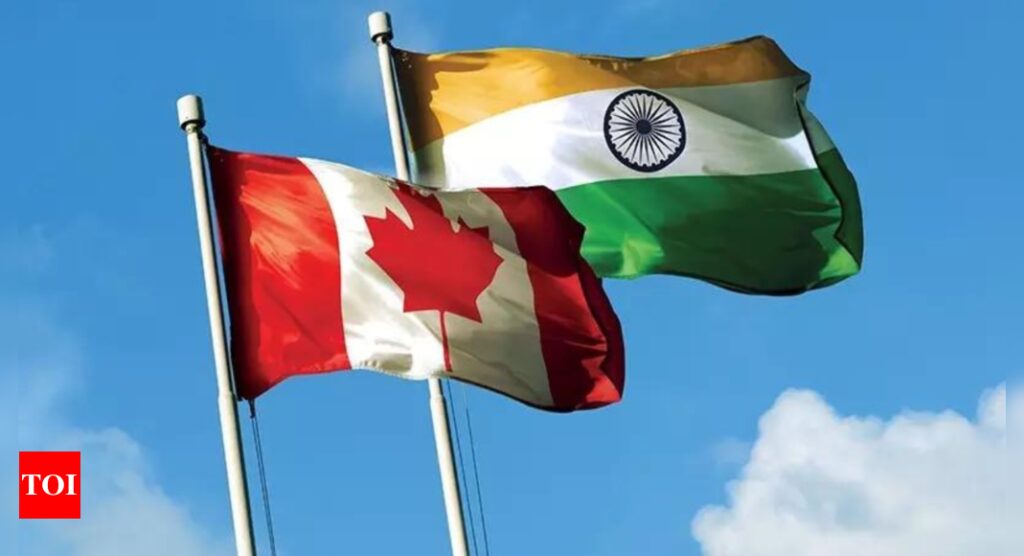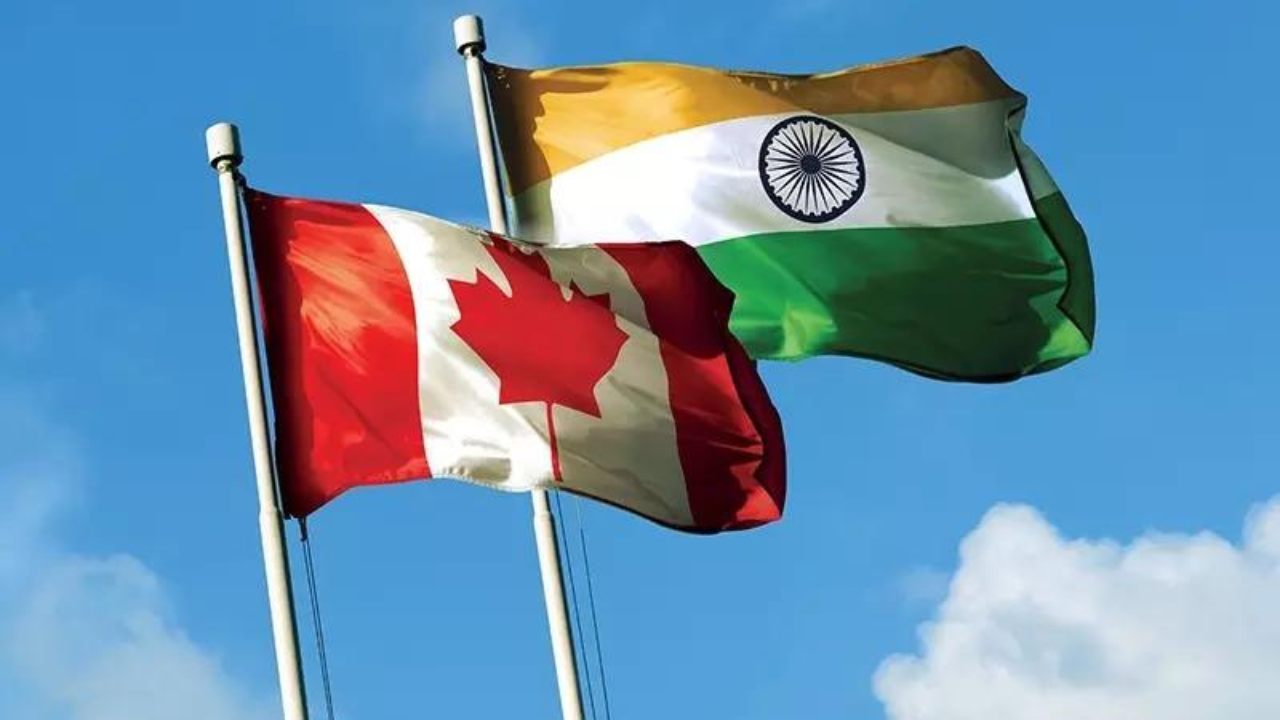[ad_1]
NEW DELHI: India’s efforts to ensure parity in diplomatic presence with Canada finally saw Ottawa pulling out 41 diplomats while accusing the Indian government of violating the Vienna Convention on Diplomatic Relations by forcing it to downsize its mission here, reports Sachin Parashar.
India rejected Canada’s argument and said the state of the bilateral relationship, which has been exacerbated by PM Justin Trudeau’s allegation that Indian agents bumped off pro-Khalistan terrorist Hardeep Singh Nijjar, and “interference by Canadian diplomats in India’s internal affairs”, warranted parity in mutual diplomatic presence.
While Canada is not asking India to reduce its diplomatic strength, foreign minister Melanie Joly warned the drawdown will have consequences and that Canada had to pause all in-person services in its consulates in Chandigarh, Mumbai and Bengaluru. Indian government sources, however, said Canada’s decision to suspend services in the cities was unilateral and not related to implementation of parity that was sought by India only for the missions in New Delhi and Ottawa.
With the withdrawal of 41 diplomats, Canada now has only 21 left here, in consonance with India’s own diplomatic presence in that country. The government said it had been engaged with Canada on the parity issue over the last month in order to work out the details and modalities of its implementation. The deadline for the downsizing was October 10 but later extended to October 30.
According to Indian sources, the government had told Canada that only a certain number of diplomats would continue to enjoy diplomatic immunity and privileges after October 30 and that things were worked out in consultation with Canadian authorities, contrary to Canada’s claim that India had acted arbitrarily.
Responding to Joly’s claim that India had violated diplomatic norms, the Indian government said in a statement its actions in implementing parity were fully consistent with Article 11.1 of the Vienna Convention that allows the receiving state to determine the size of a foreign mission in the absence of any specific agreement about its size. The article states that in the absence of “specific agreement as to the size of the mission, the receiving state may require that the size of a mission be kept within limits considered by it to be reasonable and normal, having regard to circumstances and conditions in the receiving state and to the needs of the particular mission”.
“We reject any attempt to portray the implementation of parity as a violation of international norms,” the Indian government said. It said the same provision had been used by other countries in the past and that Canada’s own domestic legislation provided for “comparable” treatment to foreign diplomats and also withdrawal of their immunity and privileges.
While there have been questions about the impact of Canada’s downsizing on Indian nationals seeking Canadian visas, particularly students, the Indian government has maintained its top priority is to ensure parity as Canadian diplomats were engaged in “anti-India activities”. Canada is also home to a 1.7-million-strong Indian diaspora.
Following the controversy over Canadian national Nijjar’s killing, which saw Canada claiming Indian involvement but not backing it up with evidence, the government had threatened to revoke the diplomatic immunity of Canadian diplomats if Ottawa didn’t cut its staff strength here. Trudeau recently riled the Indian government again by raising the Nijjar issue in his conversations with Arab leaders considered friendly to India.
“A unilateral revocation of diplomatic privileges and immunities is contrary to international law. It is a clear violation of the Vienna Convention on Diplomatic Relations,” said Joly, as she confirmed the withdrawal of 41 diplomats.
“And threatening to do so is unreasonable and escalatory. This drawdown has consequences. It will lead to a downgrade of service in three consulates. Unfortunately, we have had to pause all in-person services at our consulates in Chandigarh, Mumbai and Bengaluru,” she added. The minister, however, said Canada will continue to engage with India and that “now more than ever, we need to have diplomats on the ground and we need to talk to one another”.
Joly has been looking to engage India privately on the Nijjar issue and was reported to have met her counterpart S Jaishankar in Washington last month. India has not denied reports about the meeting. While India has described the Canadian allegations as absurd, the Five Eyes alliance apart from Canada has sought India’s cooperation in the probe into Nijjar’s murder.
India rejected Canada’s argument and said the state of the bilateral relationship, which has been exacerbated by PM Justin Trudeau’s allegation that Indian agents bumped off pro-Khalistan terrorist Hardeep Singh Nijjar, and “interference by Canadian diplomats in India’s internal affairs”, warranted parity in mutual diplomatic presence.
While Canada is not asking India to reduce its diplomatic strength, foreign minister Melanie Joly warned the drawdown will have consequences and that Canada had to pause all in-person services in its consulates in Chandigarh, Mumbai and Bengaluru. Indian government sources, however, said Canada’s decision to suspend services in the cities was unilateral and not related to implementation of parity that was sought by India only for the missions in New Delhi and Ottawa.
With the withdrawal of 41 diplomats, Canada now has only 21 left here, in consonance with India’s own diplomatic presence in that country. The government said it had been engaged with Canada on the parity issue over the last month in order to work out the details and modalities of its implementation. The deadline for the downsizing was October 10 but later extended to October 30.
According to Indian sources, the government had told Canada that only a certain number of diplomats would continue to enjoy diplomatic immunity and privileges after October 30 and that things were worked out in consultation with Canadian authorities, contrary to Canada’s claim that India had acted arbitrarily.
Responding to Joly’s claim that India had violated diplomatic norms, the Indian government said in a statement its actions in implementing parity were fully consistent with Article 11.1 of the Vienna Convention that allows the receiving state to determine the size of a foreign mission in the absence of any specific agreement about its size. The article states that in the absence of “specific agreement as to the size of the mission, the receiving state may require that the size of a mission be kept within limits considered by it to be reasonable and normal, having regard to circumstances and conditions in the receiving state and to the needs of the particular mission”.
“We reject any attempt to portray the implementation of parity as a violation of international norms,” the Indian government said. It said the same provision had been used by other countries in the past and that Canada’s own domestic legislation provided for “comparable” treatment to foreign diplomats and also withdrawal of their immunity and privileges.
While there have been questions about the impact of Canada’s downsizing on Indian nationals seeking Canadian visas, particularly students, the Indian government has maintained its top priority is to ensure parity as Canadian diplomats were engaged in “anti-India activities”. Canada is also home to a 1.7-million-strong Indian diaspora.
Following the controversy over Canadian national Nijjar’s killing, which saw Canada claiming Indian involvement but not backing it up with evidence, the government had threatened to revoke the diplomatic immunity of Canadian diplomats if Ottawa didn’t cut its staff strength here. Trudeau recently riled the Indian government again by raising the Nijjar issue in his conversations with Arab leaders considered friendly to India.
“A unilateral revocation of diplomatic privileges and immunities is contrary to international law. It is a clear violation of the Vienna Convention on Diplomatic Relations,” said Joly, as she confirmed the withdrawal of 41 diplomats.
“And threatening to do so is unreasonable and escalatory. This drawdown has consequences. It will lead to a downgrade of service in three consulates. Unfortunately, we have had to pause all in-person services at our consulates in Chandigarh, Mumbai and Bengaluru,” she added. The minister, however, said Canada will continue to engage with India and that “now more than ever, we need to have diplomats on the ground and we need to talk to one another”.
Joly has been looking to engage India privately on the Nijjar issue and was reported to have met her counterpart S Jaishankar in Washington last month. India has not denied reports about the meeting. While India has described the Canadian allegations as absurd, the Five Eyes alliance apart from Canada has sought India’s cooperation in the probe into Nijjar’s murder.
[ad_2]
Source link











More Stories
We can’t wait to face India in the final: Pat Cummins | Cricket News
Railways plans 3,000 additional trains in next 4-5 years to minimise number of waitlisted tickets | India News
Faridabad: Man dies after ‘falling from hotel room window’ while partying with friends